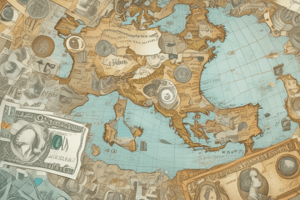Podcast
Questions and Answers
What is the system where exchange rates are fixed and tied to a specific value or currency basket?
What is the system where exchange rates are fixed and tied to a specific value or currency basket?
- Fixed exchange rate system
- Floating exchange rate system
- Managed float system
- Bretton Woods system (correct)
Which type of investment involves establishing a business or acquiring a controlling interest in a foreign company?
Which type of investment involves establishing a business or acquiring a controlling interest in a foreign company?
- Portfolio investment
- Foreign trade
- Direct investment (correct)
- International finance
What is the term for the risk that changes in exchange rates may negatively affect the value of an investment?
What is the term for the risk that changes in exchange rates may negatively affect the value of an investment?
- Currency risk (correct)
- Political risk
- Cultural risk
- Economic risk
What is the term for trade in services, such as tourism and financial services?
What is the term for trade in services, such as tourism and financial services?
What is the term for a system where exchange rates are determined by market forces?
What is the term for a system where exchange rates are determined by market forces?
What is the term for a government's deliberate intervention in the foreign exchange market to influence the exchange rate?
What is the term for a government's deliberate intervention in the foreign exchange market to influence the exchange rate?
What is the term for the market where currencies are traded?
What is the term for the market where currencies are traded?
What is the term for a limit on the amount of a particular good that can be imported into a country?
What is the term for a limit on the amount of a particular good that can be imported into a country?
Flashcards are hidden until you start studying
Study Notes
Exchange Rates
- Definition: The price of one country's currency in terms of another country's currency.
- Types:
- Fixed exchange rate: Pegged to a specific value or currency basket.
- Floating exchange rate: Determined by market forces.
- Managed float: A combination of fixed and floating exchange rates.
- Factors affecting exchange rates:
- Inflation rates
- Interest rates
- Balance of payments
- Government intervention
- Speculation
- Exchange rate systems:
- Bretton Woods system (1944-1971): Fixed exchange rates tied to the US dollar.
- European Exchange Rate Mechanism (ERM): Fixed exchange rates among European currencies.
Foreign Investment
- Definition: Investment in a foreign country, either through direct investment or portfolio investment.
- Types:
- Direct investment: Establishing a business or acquiring a controlling interest in a foreign company.
- Portfolio investment: Investing in foreign securities, such as stocks and bonds.
- Benefits:
- Diversification
- Increased efficiency
- Access to new markets
- Improved competitiveness
- Risks:
- Political risk
- Economic risk
- Cultural risk
- Currency risk
International Trade
- Definition: The exchange of goods and services across international borders.
- Types:
- Visible trade: Trade in goods, such as manufactured products.
- Invisible trade: Trade in services, such as tourism and financial services.
- Theories:
- Absolute advantage: Countries specialize in producing goods in which they have an absolute advantage.
- Comparative advantage: Countries specialize in producing goods in which they have a lower opportunity cost.
- Trade barriers:
- Tariffs
- Quotas
- Embargoes
- Non-tariff barriers (e.g. subsidies, regulations)
Global Financial Markets
- Definition: Markets that facilitate the exchange of financial assets across international borders.
- Types:
- Foreign exchange market (Forex)
- International bond market
- International stock market
- Derivatives market (e.g. options, futures)
- Importance:
- Facilitates international trade and investment
- Provides access to capital
- Enhances efficiency and liquidity
Currency Risk Management
- Definition: The process of minimizing the risks associated with exchange rate fluctuations.
- Types of risk:
- Transaction risk: Risk associated with converting currencies for a specific transaction.
- Translation risk: Risk associated with converting financial statements from one currency to another.
- Economic risk: Risk associated with changes in exchange rates affecting a company's competitiveness.
- Techniques:
- Forward contracts
- Futures contracts
- Options contracts
- Swaps
- Hedging
- Diversification
Exchange Rates
- Exchange rate is the price of one country's currency in terms of another country's currency
- Three types of exchange rates:
- Fixed exchange rate: Pegged to a specific value or currency basket
- Floating exchange rate: Determined by market forces
- Managed float: A combination of fixed and floating exchange rates
- Factors affecting exchange rates:
- Inflation rates
- Interest rates
- Balance of payments
- Government intervention
- Speculation
- Two exchange rate systems:
- Bretton Woods system (1944-1971): Fixed exchange rates tied to the US dollar
- European Exchange Rate Mechanism (ERM): Fixed exchange rates among European currencies
Foreign Investment
- Foreign investment is investment in a foreign country, either through direct investment or portfolio investment
- Two types of foreign investment:
- Direct investment: Establishing a business or acquiring a controlling interest in a foreign company
- Portfolio investment: Investing in foreign securities, such as stocks and bonds
- Benefits of foreign investment:
- Diversification
- Increased efficiency
- Access to new markets
- Improved competitiveness
- Risks of foreign investment:
- Political risk
- Economic risk
- Cultural risk
- Currency risk
International Trade
- International trade is the exchange of goods and services across international borders
- Two types of international trade:
- Visible trade: Trade in goods, such as manufactured products
- Invisible trade: Trade in services, such as tourism and financial services
- Two theories of international trade:
- Absolute advantage: Countries specialize in producing goods in which they have an absolute advantage
- Comparative advantage: Countries specialize in producing goods in which they have a lower opportunity cost
- Trade barriers:
- Tariffs
- Quotas
- Embargoes
- Non-tariff barriers (e.g. subsidies, regulations)
Global Financial Markets
- Global financial markets facilitate the exchange of financial assets across international borders
- Four types of global financial markets:
- Foreign exchange market (Forex)
- International bond market
- International stock market
- Derivatives market (e.g. options, futures)
- Importance of global financial markets:
- Facilitates international trade and investment
- Provides access to capital
- Enhances efficiency and liquidity
Currency Risk Management
- Currency risk management is the process of minimizing the risks associated with exchange rate fluctuations
- Three types of currency risk:
- Transaction risk: Risk associated with converting currencies for a specific transaction
- Translation risk: Risk associated with converting financial statements from one currency to another
- Economic risk: Risk associated with changes in exchange rates affecting a company's competitiveness
- Techniques for managing currency risk:
- Forward contracts
- Futures contracts
- Options contracts
- Swaps
- Hedging
- Diversification
Studying That Suits You
Use AI to generate personalized quizzes and flashcards to suit your learning preferences.




